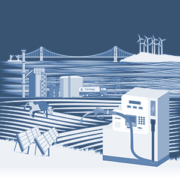Renewable diesel in the USA
Cerulogy’s 2022 report ‘Animal, Vegetable, or Mineral (Oil)?’ explored how aggressive expansion of renewable diesel1 production in the USA impacts markets for vegetable oils around the world (Malins & Sandford, 2022). This retrospective blog post evaluates how the renewable diesel industry has grown in response to various market pressures since that report, which we’ll call AVMO for short, was published.
A renewable diesel construction boom has been underway for some years, fuelled by a generous policy environment. AVMO highlighted that, in 2022, fuel suppliers who were able to stack incentives from the USA’s Renewable Fuel Standard (RFS), the blender’s tax credit, and California’s Low Carbon Fuel Standard, should be able to realise $4 of policy value per gallon of renewable diesel they brought to market. The technology for making renewable diesel is well established — there’s a lot of overlap with petroleum refining – and this $4 policy value would support robust company profit margins. In other words, building new plants was a promising investment.
Back in 2022 when we wrote AVMO, the capacity of existing renewable diesel projects and projects that had been announced came to around 5 billion gallons per year. Feeding these plants would require about 17 million tonnes of lipid feedstock per year (at full utilisation). Exactly where all this material would all come from was a subject of concern for the environmental community, as there are essentially two types of lipid feedstock and both come with sustainability risks.
Biofuels made from residual oils – that is, used cooking oil and low-grade animal fat – are generally considered to be more sustainable than those made from crops in terms of their carbon, land, and pollution footprints. But these feedstocks are in limited supply and may already be used in other sectors. Diverting them for biofuel production may force incumbent users to compensate by switching to virgin vegetable oils; this would negate any benefit from using residue-based biofuels when looking at the big picture.
As for crop-based oils, our AVMO report found that domestic on-farm productivity improvements would be unable to keep pace with biofuel demand. Unabated biofuel demand in the USA would therefore have repercussions on global food markets, raising prices and stimulating land use change.
Recent developments
Fast-forward to the end of 2024 and there is little sign of these issues abating. Figure 1 shows that even more capacity has been deployed than had been expected, and EIA’s updated analysis shows the trend continuing into the future (U.S. Energy Information Administration, 2024d). Capacity utilisation in existing plants varies month-on-month depending on input costs and demand levels, but over the past two years it has mostly stayed in the 70-80% range (U.S. Energy Information Administration, 2024c, 2024a)2. In 2024, we expect to see actual production surpass 4 billion gallons.

Figure 1 Announced capacity expansion and observed trends in USA renewable diesel production capacity
Source: U.S. Energy Information Administration (2021, 2024d)
One possibility we discussed in 2022 was that growth in renewable production would divert feedstock from the biodiesel industry, leading to reduced biodiesel supply3. In fact, EIA data (Figure 2) show a biodiesel market that has been fairly stable since at least 2020, with no obvious indication that growth in the renewable diesel market is reducing biodiesel consumption.

Figure 2 Monthly biodiesel and renewable diesel consumption in the USA
Source: U.S. Energy Information Administration (2024b)
The EPA sets its annual RFS obligation at a level it considers to be in line with sustainable growth of feedstock supply. Figure 3 looks back in time to show that supply of bio-based diesel has consistently exceeded the RFS obligation, with a clear acceleration in recent years.

Figure 3 Consumption of bio-based diesel compared with the supply obligation under the RFS, in units of ethanol gallons equivalent per year4
Source: U.S. Environmental Protection Agency (2024)
Feedstock
This has some worrying implications for virgin vegetable oil markets. Most of the rise in USA vegetable oil demand over the past decade can be traced to biodiesel and renewable diesel (Figure 4). In 2023, these accounted for nearly a third of total consumption, having risen by 4.5 Mt (230%) since 2014 (OECD, 2024). This easily outpaced, for example, the estimated 2.6 Mt (23%) growth in domestic soy oil production, and even the 3.5 Mt (24%) growth across all oil and fat production (U.S. Department of Agriculture, 2024a; U.S. Environmental Protection Agency, 2023, Figure 6.2.3-2).

Figure 4 Vegetable oil consumption in the USA
Source: OECD (2024)
The USDA notes that canola/rapeseed imports from Canada have reached an all-time high, while net exports of soybeans and soybean oil have declined and the U.S. became a net importer of soybean oil in 2023 (U.S. Department of Agriculture, 2024c). As seen in Figure 5, the long-term gradual rise in net vegetable oil imports saw a jump in 2022 with a surge in rapeseed imports and a rapid reduction in soybean oil exports. These trends have been linked to biofuel demand, with the USDA using remarkably strident language in its analysis of the impacts biofuels were having on feedstock trade (U.S. Department of Agriculture, 2024b, 2024c).

Figure 5 USA’s net imports of key vegetable oils
Note: These data cover oils but omit trade in uncrushed soybeans and rapeseed.
Source: U.S. Department of Agriculture (2024a)
The extra demand for vegetable oil at home and abroad, coupled with reduced exports from the USA, has resulted in a favourable market for Brazilian soybeans. These are sold in high volumes on world commodity markets and often at a lower price than competitors (U.S. Department of Agriculture, 2024c). Given the connection between Brazilian soy and deforestation in the Amazon rainforest (Malins, 2020), this relationship is very suggestive of indirect land-use change (ILUC) effects in action, emanating from USA biofuels policy and creating pressure for soybean expansion in South America.
Future developments
The USA’s renewable diesel boom shows no sign of slowing, and the continuing pressure on the vegetable oil market can be expected to lead to ever-increasing reliance on imports. From 2025, federal subsidies for biodiesel and renewable diesel through the 1 $/gallon ‘blender’s tax credit’ will no longer be available to imported fuel, but the restriction does not extend to imported feedstock, and there’s no evidence that the change will seriously affect current trends. Existing and planned renewable diesel facilities are set to continue to be well utilised going forward, meaning lots of lipid consumption.
This positive outlook for the biofuels industry will at best prolong (and probably exacerbate) the sustainability risks highlighted in the AVMO report (Malins & Sandford, 2022). When growth in demand for food commodities outstrips growth in supply, food prices surge (see Figure 6). In the short term, this impacts consumers around the world, including those living in and close to poverty. In the medium term, higher prices drive farmers towards agricultural intensification and expansion. The resulting pollution, land use change, habitat loss, and greenhouse gas emissions should be a cause for concern among environmentalists in the USA and beyond.

Figure 6 Soy oil price, 1990-2023, in 2010 USD
Source: World Bank Commodity Pink Sheet
Footnotes
1 Renewable diesel is also known as hydroprocessed vegetable oil (HVO). We use the term renewable diesel here to fit with the USA context.
2 Recent divergences are seen in May 2024 when production output declined sharply, or in July 2024 when total capacity fell due to sluggish demand putting an operator out of business (Khan, 2024).
3 The highest returns for fuel suppliers are realised in states with an extra layer of policy incentive (such as California’s LCFS), so for a fuel supplier it would make financial sense to cram as much fuel as possible into those markets. Biodiesel is limited by a blend wall; renewable diesel isn’t.
4 RFS obligation levels are stated as a number of ethanol gallons equivalent and we follow this convention (1 EGE = 75,583 British thermal units on a lower-heating basis). Due to the varying energy content of different fuels, 1 EGE translates to about 0.63 gallons of biodiesel or 0.59 gallons of renewable diesel.
References
Khan, S. (2024, September 30). US renewable diesel production capacity posts largest monthly decline on record. Reuters. https://www.reuters.com/business/energy/us-renewable-diesel-production-capacity-posts-largest-monthly-decline-record-2024-09-30
Malins, C. (2020). Soy, land use change, and ILUC-risk. In Cerulogy. https://www.cerulogy.com/soy-land-use-change-and-iluc-risk/
Malins, C., & Sandford, C. (2022). Animal, vegetable or mineral (oil)? Exploring the potential impacts of new renewable diesel capacity on oil and fat markets in the United States. Cerulogy. https://theicct.org/publication/impact-renewable-diesel-us-jan22/
OECD. (2024). OECD-FAO Agricultural Outlook 2024-2033. OECD Data Explorer. https://data-explorer.oecd.org/?lc=en
U.S. Department of Agriculture. (2024a). Oil Crops Yearbook: Dataset. Economic Research Service. https://usda.library.cornell.edu/concern/publications/5x21tf41f?locale=en
U.S. Department of Agriculture. (2024b). Oilseeds: World Markets and Trade. In Foreign Agricultural Service. https://apps.fas.usda.gov/psdonline/circulars/oilseeds.pdf
U.S. Department of Agriculture. (2024c). U.S. Renewable Diesel Production Growth Drastically Impacts Global Feedstock Trade. International Agricultural Trade Report. https://fas.usda.gov/data/us-renewable-diesel-production-growth-drastically-impacts-global-feedstock-trade
U.S. Energy Information Administration. (2021, July 29). U.S. renewable diesel capacity could increase due to announced and developing projects. Today in Energy. https://www.eia.gov/todayinenergy/detail.php?id=48916
U.S. Energy Information Administration. (2024a). Biofuels operable production capacity. Monthly Biofuels Capacity and Feedstocks Update. https://www.eia.gov/biofuels/update/
U.S. Energy Information Administration. (2024b). Table 10.4a Biodiesel Overview. Monthly Energy Review. https://www.eia.gov/totalenergy/data/browser/index.php?tbl=T10.04A
U.S. Energy Information Administration. (2024c). Table 10.4b Renewable Diesel Fuel Overview. Monthly Energy Review. https://www.eia.gov/totalenergy/data/browser/index.php?tbl=T10.04B#/
U.S. Energy Information Administration. (2024d). U.S. Renewable Diesel Fuel and Other Biofuels Plant Production Capacity. Petroleum & Other Liquids. https://www.eia.gov/biofuels/renewable/capacity/
U.S. Environmental Protection Agency. (2023). Renewable Fuel Standard (RFS) Program: Standards for 2023–2025 and Other Changes | Regulatory Impact Analysis. https://downloads.regulations.gov/EPA-HQ-OAR-2021-0427-1114/content.pdf
U.S. Environmental Protection Agency. (2024). RINs Generated Transactions. Fuels Registration, Reporting, and Compliance. https://www.epa.gov/fuels-registration-reporting-and-compliance-help/rins-generated-transactions
















